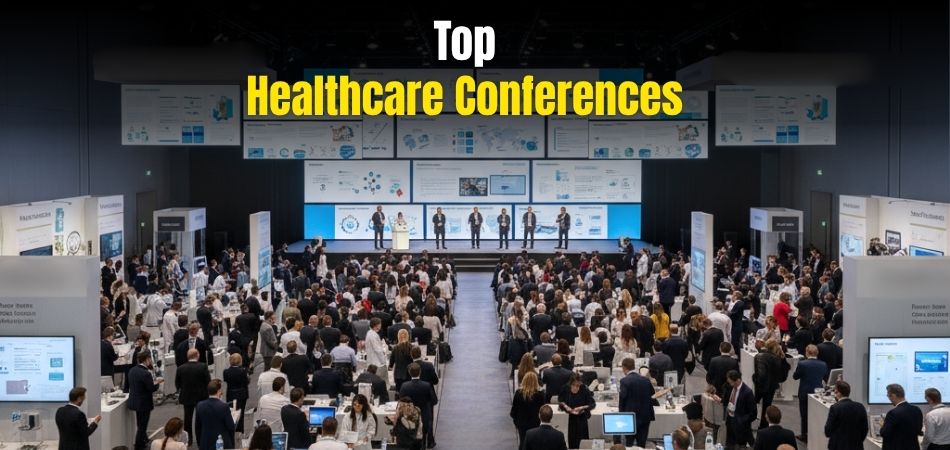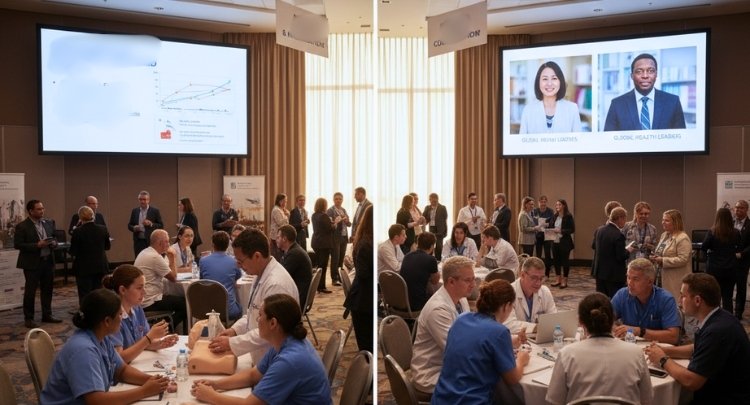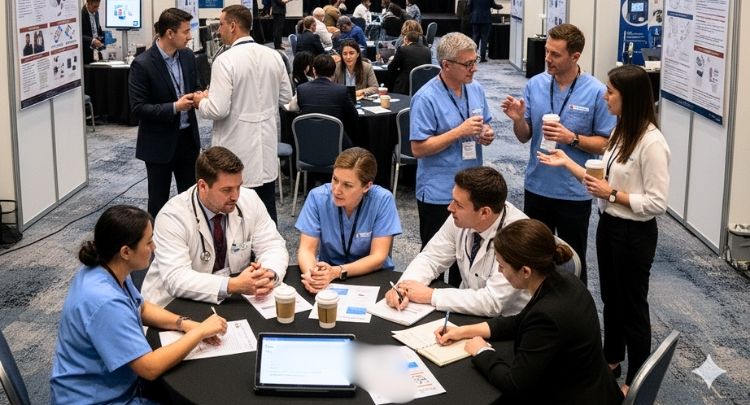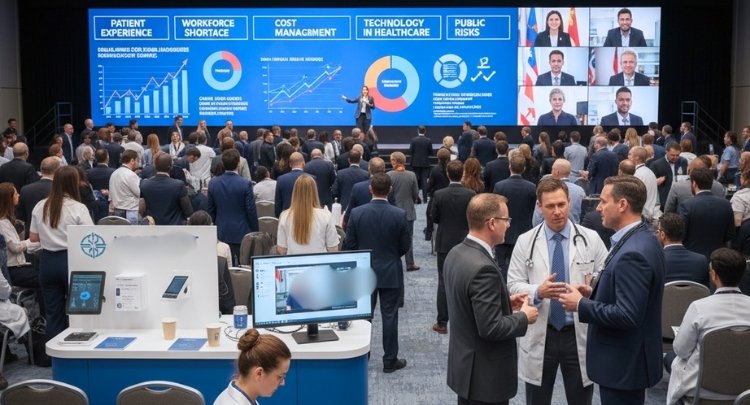Healthcare is at the center of human well-being, shaping how people live healthier and longer lives. Around the world, experts, researchers, and professionals gather to share knowledge, and many are curious to know about the top healthcare conferences.
Attending healthcare events builds knowledge, teamwork, and better care. Key events include the 14th Global Conference on Nursing and Healthcare Management, the IHI/BMJ International Forum on Quality and Safety in Healthcare: Canberra 2025, and the 9th Global Conference on Healthcare Policy and Management. These events focus on leadership, safety, and smart policies.
Are you curious to learn more about the conferences, the opportunities they provide, and the challenges they address? If yes, keep reading because this article covers everything you need to know about healthcare events and their impact worldwide.
Top Healthcare Conferences
Healthcare is one of the most important fields where experts constantly meet to share knowledge, discuss new trends, and find better ways to serve people. These events bring doctors, researchers, and leaders together from around the world. If you want to know about some top healthcare conferences, check out the details below.
| Date | Conference Name | Location |
| December 13, 2025 | 14th Global Conference on Nursing and Healthcare Management | Vancouver, Canada |
| November 19–21, 2025 | IHI/BMJ International Forum on Quality and Safety in Healthcare: Canberra 2025 | Canberra, Australia |
| December 13, 2025 | 9th Global Conference on Healthcare Policy and Management | Vancouver, Canada |
| November 27–29, 2025 | Australasian Doctors’ Health Conference 2025 | Melbourne, Australia |
| December 13, 2025 | 9th Global Conference on Healthcare Leadership and Management | Vancouver, Canada |
| February 16–17, 2026 | Annual Telehealth Australia 2026 | Melbourne, Australia |
| March 9–12, 2026 | HIMSS26 – Global Health Conference & Exhibition | Las Vegas, USA |
| March 17–18, 2026 | Annual Medico-Legal Congress | Sydney, Australia |
| April 7–9, 2026 | Health 2.0 Conference 2026 | Las Vegas, USA |
| June 23–24, 2026 | International Conference on Global Public Health 2026 | Dubai, UAE |
1. 14th Global Conference on Nursing and Healthcare Management (GCNHM)
Many professionals gather to explore leadership and practical methods that improve nursing and healthcare systems. The event is scheduled for December 13, 2025, in Vancouver, Canada. It is counted among the most notable upcoming international conferences that highlight management strategies, modern nursing roles, and patient-centered practices. Experts join here to share methods that make healthcare more effective, efficient, and sustainable.
2. IHI/BMJ International Forum on Quality and Safety in Healthcare: Canberra 2025
Discussions at this event focus on safe, reliable, and high-quality healthcare services. It will take place from November 19 to 21, 2025, in Canberra, Australia. The theme “Think differently, start small, have impact” aims to encourage new solutions and collective action. Participants here reflect on challenges and share real stories that inspire lasting changes in how care is delivered.
3. 9th Global Conference on Healthcare Policy and Management (GCHPM)
A wide range of policy and management challenges in health are addressed during this gathering. On December 13, 2025, in Vancouver, Canada, leaders and specialists will exchange insights on improving policy planning, decision-making, and system reforms. The goal is to make healthcare more accessible, affordable, and sustainable. Sessions highlight practical policies that bring measurable benefits to communities worldwide.
4. Australasian Doctors’ Health Conference 2025
Attention is given to the well-being of medical professionals, workplace culture, and peer support systems. The event will run from November 27 to 29, 2025, in Melbourne, Australia. Organized by Doctors’ Health Alliance, it looks at building healthier environments for doctors. This conference emphasizes the importance of mental health, workplace balance, and supportive networks that keep medical professionals strong in their demanding roles.
5. 9th Global Conference on Healthcare Leadership and Management (GCHLM)
The focus here is on leadership skills and strategies that shape the healthcare sector. Scheduled for December 13, 2025, in Vancouver, Canada, the meeting brings together global leaders to share knowledge. Topics often include innovative management methods, leadership growth, and organizational improvements. Attendees learn about real-world applications that strengthen healthcare teams and help systems adapt to rapid changes.
6. Annual Telehealth Australia 2026
Digital communication and virtual care are central themes during this conference. On February 16 and 17, 2026, the event will be held in Melbourne, Australia. It covers telehealth advancements that make healthcare more accessible across distances. Participants learn about telemedicine, digital consultations, and technology that connects patients with doctors faster. This conference highlights how telehealth is becoming a trusted part of modern healthcare.
7. HIMSS26 – Global Health Conference & Exhibition
Innovations in digital health and IT systems take the spotlight here. From March 9 to 12, 2026, this massive event will be hosted in Las Vegas, USA. Attendees engage with experts on topics such as system integration, policy, and tech trends. It is known for its exhibitions that showcase cutting-edge solutions in health IT, offering valuable insights into the future of digital healthcare.
8. Annual Medico-Legal Congress
Legal and ethical aspects of healthcare are carefully discussed at this event. Taking place on March 17 and 18, 2026, in Sydney, Australia, it is organized by Informa Connect Australia. The conference covers medico-legal risks, compliance, and frameworks tied to medical practice. Experts examine real cases, practical rules, and evolving standards that ensure fairness and safety in medical decisions and patient care.
9. Health 2.0 Conference 2026
The event brings a mix of innovators, startups, and healthcare leaders together to discuss progress in technology. From April 7 to 9, 2026, it will be hosted in Las Vegas, USA. Sessions cover digital health advancements, system improvements, and new ways to connect patients with services. This conference has a reputation for being a place where emerging solutions and ideas are shared.
10. International Conference on Global Public Health 2026
Attention at this conference is on public health issues that affect communities worldwide. On June 23 and 24, 2026, it will take place in Dubai, UAE, hosted by health3000.org. Discussions include sustainability, equity, and climate-related health challenges. Experts also focus on preventing non-communicable diseases, maternal care, child health, and digital tools. It highlights global cooperation in building healthier and stronger societies.
Healthcare events like these help improve knowledge, teamwork, and practices that directly shape patient care. They provide a stage where ideas can turn into solutions that support global health needs. Keeping track of such events helps us stay informed.
Why Are Healthcare Conferences Valuable for Doctors and Medical Students?
Healthcare conferences are more than just big meetings. They create spaces where ideas can be shared, skills can be improved, and new opportunities can be discovered. For doctors and medical learners, these events can play an important role in shaping their future. Let’s look at how they bring real value.
Skill Development
Attending healthcare events helps professionals and learners sharpen their skills through workshops, training sessions, and real-world case studies. These activities show how knowledge is applied in practice. Doctors and medical students gain confidence by practicing with expert guidance, making them better prepared to deal with everyday challenges.
Networking Opportunities
Meeting people face-to-face in these events allows participants to build lasting connections. Doctors and learners can interact with peers, senior experts, and healthcare leaders. These networks often lead to mentorship, collaborations, or even career opportunities. Strong relationships built during conferences can support both personal growth and professional advancement.
Latest Updates
Medicine and healthcare change quickly, with new treatments, technologies, and methods introduced regularly. Conferences give direct access to this fresh knowledge through presentations and panel talks. By staying updated, doctors and learners are better equipped to improve patient care and use modern practices effectively in their work.
Career Growth
For many attendees, conferences serve as a platform to present research, share case studies, or participate in discussions. This helps doctors and learners gain recognition in their field. Presenting or even actively engaging during sessions boosts confidence and opens doors for future roles and responsibilities.
Broader Perspective
Conferences bring together people from different parts of the world, each with unique ideas and practices. This mix of perspectives broadens understanding and sparks creativity. Doctors and learners return with new insights that can be adapted to their own communities, leading to improvements in local healthcare systems.
Healthcare conferences act like stepping stones for professional growth. They allow doctors and learners to improve skills, connect with others, and stay updated with the latest knowledge, making them stronger contributors to the world of health.
What Opportunities Do Healthcare Conferences Provide for Nurses and Allied Health Workers?
Healthcare workers often meet daily challenges that demand updated skills, fresh knowledge, and teamwork. Events that bring professionals together allow them to learn, share ideas, and strengthen their abilities. These gatherings give real benefits to everyone working in health. Let’s see how they help.
- Practical Training: Workshops and sessions at these events allow nurses and allied health workers to practice hands-on skills guided by experts, improving both accuracy and confidence in real situations.
- Knowledge Sharing: Presentations cover new research, tools, and care techniques that keep participants updated. This shared learning helps workers apply better methods in their own healthcare settings.
- Team Collaboration: These events bring together people from different roles. By working as a team during discussions, participants learn how every role supports patient care.
- Professional Growth: Attending such conferences helps nurses and technicians build credibility. Learning and participation can often open doors for career progress and better responsibilities.
- Peer Support: Meeting others in the same field reduces feelings of isolation. Participants connect with people who understand their challenges and share helpful advice.
- Global Exposure: Listening to speakers from around the world allows participants to see diverse approaches, giving them new ideas that can improve local care.
- Policy Awareness: Sessions often cover rules, safety standards, and health policies, ensuring workers are aware of requirements that protect both professionals and patients.
Healthcare conferences give every professional, from nurses to technicians, the chance to grow stronger in their role. They promote confidence, teamwork, and updated knowledge, which directly improve the quality of healthcare offered to people.
How Do Healthcare Conferences Impact Medical Research and Innovation?
Healthcare conferences significantly impact medical research and innovation by serving as a central hub for sharing new knowledge, facilitating collaboration, and introducing innovative technologies. They connect researchers and industry leaders to accelerate the translation of scientific discoveries into practical applications. Let’s break down how these conferences actually make a difference in healthcare.
Introduction of New Studies and Treatments
New medical studies and treatment methodologies are often introduced at these events through formal presentations and informal discussions. Researchers can present their latest findings, which may still be unpublished, allowing for early dissemination of information. This process is crucial for several reasons:
- Real-time Feedback: Presenting research in a conference setting allows for immediate feedback from a diverse audience of peers, experts, and potential collaborators. This critique helps to refine methodologies, strengthen conclusions, and identify potential flaws before the research is formally published.
- Proof of Concept: For researchers, an oral or poster presentation at a major conference can serve as an informal “proof of concept” for their work, generating interest and demonstrating its potential impact. This can attract the attention of journals for publication or institutions for funding.
- Early Awareness: Clinicians and other healthcare professionals attending these conferences learn about the latest treatment strategies and best practices well before they are widely adopted or published. This helps them stay current with rapid changes in the field and potentially implement new, evidence-based approaches into their own practices, improving patient care.
Showcasing New Technologies
Conferences are a prime venue for showcasing new medical technologies and diagnostic tools. Tech companies and startups often attend to exhibit their latest innovations. This allows for:
- Hands-on Experience: Attendees can often get a hands-on demonstration of new medical devices, software, or equipment. This direct interaction provides a better understanding of the technology than a written description ever could. For example, a surgeon might be able to try out a new robotic surgery system, or a radiologist could see a live demo of an AI-powered diagnostic tool.
- Market Validation: Introducing a new technology at a conference provides valuable market validation. Presenters and exhibitors receive direct feedback from potential users, helping them to refine their products and ensuring they meet the real-world needs of healthcare professionals. This feedback loop is essential for a technology’s successful development and adoption.
Promoting Collaboration and Networking
One of the most profound impacts of healthcare conferences is their role in developing networking and collaboration. They bring together a diverse range of professionals, including researchers from different institutions, clinicians from various hospitals, and representatives from pharmaceutical and biotech companies. This environment facilitates:
- Cross-disciplinary Partnerships: A gastroenterologist might meet a biomedical engineer, leading to a collaboration on developing a new diagnostic device for gut health. This kind of interdisciplinary networking is a major driver of innovation.
- Recruitment and Funding: Conferences are where researchers can connect with funding organizations, and institutions can recruit top talent for clinical trials or new research projects. It’s a key setting for securing the resources needed to move a project from the lab to the clinic.
- Knowledge Exchange: The informal conversations that happen at coffee breaks or during social events are just as valuable as the formal sessions. These interactions allow for a free exchange of ideas and experiences, which can spark new research questions or lead to creative solutions for existing problems.
How Do Healthcare Conferences Encourage Collaboration Between Developed and Developing Countries?
Healthcare events often bring together people from many countries, creating platforms where ideas, skills, and tools can be shared. These gatherings allow professionals to build stronger connections across borders. To understand how they encourage collaboration, let’s explore their key benefits.
Knowledge Sharing
Special sessions provide chances for professionals from both developed and developing regions to exchange lessons. Experts present their practices, while others share local solutions. This balanced sharing helps all sides learn from each other and adapt methods to fit different healthcare systems.
Technology Transfer
Conferences allow developing nations to see new tools and systems in action. Companies and experts often showcase devices and digital solutions. By understanding these technologies directly, participants can find ways to introduce them in affordable and practical ways back home.
Research Partnerships
Joint projects often begin during conversations at these events. Researchers from developed nations find local insights, while developing countries gain access to larger studies and funding. This teamwork improves healthcare research and creates stronger studies that benefit global communities.
Training Access
Workshops and demonstrations provide direct skill-building opportunities. Professionals from developing regions benefit by learning modern practices hands-on. Developed countries also gain new perspectives by seeing how their methods might be adapted or simplified for use in limited-resource settings.
Funding Support
Opportunities to meet investors, non-profits, and international organizations are common at conferences. Developing countries often secure financial support for health programs. Meanwhile, developed countries see the impact of their contributions, encouraging more funding toward global health initiatives.
Healthcare conferences build meaningful bridges across regions. They give space for exchanging knowledge, building partnerships, and supporting progress. These events help create a more connected world where better healthcare can reach people everywhere.
What Challenges are Addressed at Healthcare Conferences?
Healthcare meetings bring professionals together to discuss problems faced in different areas of medicine and public health. These events are not only about progress but also about dealing with serious issues. To see what challenges are usually addressed, let’s explore further.
Patient Safety
One of the most important concerns is how to make healthcare safer for patients. Errors, infections, and gaps in communication are studied closely. By reviewing real cases, professionals learn how to prevent mistakes and improve trust in healthcare services worldwide.
Workforce Stress
Healthcare workers often face high stress and long hours, which can affect their well-being. Conferences address this by sharing solutions such as better shift systems, mental health support, and fair workplace practices. The goal is to protect workers while maintaining quality care.
Rising Costs
The increasing cost of treatments and medicines is another challenge. Experts come together to discuss how to manage resources wisely. By exchanging strategies, they look for ways to make healthcare more affordable without reducing the quality of service provided to patients.
Digital Gaps
Not all regions have the same access to modern technology. At conferences, this gap is highlighted, and discussions are held on how to bring digital tools to underserved areas. Affordable systems and training are suggested to help bridge this difference effectively.
Global Threats
Diseases that spread quickly, like pandemics, remain a shared concern. Experts share lessons learned from past outbreaks and prepare plans for the future. By working together, they aim to respond faster and reduce harm when global health emergencies arise.
Healthcare conferences help in addressing the real problems faced in the field. By focusing on safety, affordability, and global readiness, these events encourage solutions that make healthcare stronger and more reliable for everyone.
How Do Healthcare Conferences Impact the Future of Patient Care?
Healthcare gatherings are not only about sharing success stories but also about facing real problems in the medical world. These events allow experts to come together and talk openly about pressing issues. To know which challenges are highlighted, keep reading.
Patient Experience
Improving how patients feel during treatment is always a top concern. Conferences focus on better communication, shorter waiting times, and more comfort. By discussing these factors, professionals can create care systems that give patients trust and satisfaction along with medical results.
Workforce Shortage
Many regions lack enough trained healthcare staff, leading to delays and pressure on workers. Conferences explore strategies to train more people, improve retention, and provide balanced workloads. Ideas are shared to ensure communities everywhere have skilled professionals available when needed.
Cost Management
High costs of medicines, devices, and treatments create barriers for many patients. Discussions at events look for smart financial solutions and efficient planning. The aim is to deliver quality healthcare without unnecessary expenses, making treatments more accessible and sustainable worldwide.
Technology Use
New technologies are spreading quickly, but not every healthcare system is ready. Events explore how hospitals can adopt tools like telehealth, digital records, and smart devices. By sharing experiences, professionals identify challenges and solutions to bring technology into everyday healthcare smoothly.
Public Health Risks
Large-scale health problems, such as pandemics, climate-linked diseases, or lifestyle illnesses, remain urgent. Conferences bring experts together to prepare action plans, share lessons, and create global safety nets. These steps help reduce harm and strengthen the ability to face future risks.
Healthcare conferences play a powerful role in addressing challenges head-on. They provide solutions that improve patient care, support workers, and prepare systems for the future, making healthcare more reliable and effective for everyone.
FAQs About Top Healthcare Conferences
Healthcare events bring together experts, leaders, and professionals from different parts of the world. They are more than formal meetings, as they serve as platforms for learning, sharing, and improving healthcare practices. Below are some common questions and their answers.
What Are the Main Goals of Top Healthcare Conferences?
The main goals are to improve patient care, share medical knowledge, and promote teamwork among healthcare professionals. These conferences create opportunities to learn about new technologies, policies, and treatment methods. They also focus on building networks that lead to better healthcare worldwide.
How Do Top Healthcare Conferences Help in Building Global Networks?
These events connect people from hospitals, research centers, universities, and companies. Meeting face-to-face builds trust and partnerships that last beyond the conference. Such networks often lead to joint projects, training exchanges, and future collaborations that strengthen global healthcare systems.
What Role Do Top Healthcare Conferences Play in Public Health Awareness?
Conferences often highlight urgent issues like pandemics, climate-related diseases, and rising health risks. They spread awareness through workshops, presentations, and debates. This helps attendees take the information back to their communities and start changes that improve public health on a larger scale.
Why Are Top Healthcare Conferences Important for Policy Discussions?
These conferences bring health ministers, policymakers, and administrators together. They provide a safe space to discuss laws, funding, and system reforms. By sharing experiences from different countries, attendees find practical ways to design policies that improve access and fairness in healthcare.
How Do Top Healthcare Conferences Support Young Professionals?
Young doctors, nurses, and researchers often get the chance to present their work. This builds confidence and provides recognition. They also meet mentors who guide them in their careers. Exposure to new knowledge early helps them grow into strong future leaders.
What Is the Economic Impact of Top Healthcare Conferences?
Hosting these events brings benefits to local economies through travel, hotels, and tourism. More importantly, they spark healthcare investments in the host country. Exposure to global healthcare ideas also helps local hospitals and industries improve their services, which boosts both health and the economy.
How Do Top Healthcare Conferences Encourage Innovation?
By showcasing new devices, treatments, and digital tools, conferences create space for innovation. Tech companies and startups demonstrate their products directly to healthcare professionals. Feedback from doctors, nurses, and researchers helps improve these technologies and makes them more practical for real-world use.
How Are Patients Indirectly Benefited By Top Healthcare Conferences?
Patients benefit when healthcare workers bring back new knowledge and apply it in practice. Improved skills, safer treatments, and modern technologies directly raise the quality of care. The lessons learned at conferences often lead to better outcomes and healthier communities.
What Makes Top Healthcare Conferences Different From Regular Training Programs?
Unlike regular training, conferences bring together a wide range of global experts in one place. The mix of lectures, workshops, and networking creates a more complete learning experience. Attendees don’t just gain skills but also ideas, inspiration, and connections.
How Do Top Healthcare Conferences Prepare for Future Health Challenges?
By discussing threats like pandemics, workforce shortages, and rising costs, conferences help create action plans for the future. Experts share experiences from past crises and prepare better strategies. This global preparation makes healthcare systems more ready and resilient for what lies ahead.
Conclusion
Healthcare gatherings play a strong role in shaping the future of medicine, policy, and innovation. They give a platform for experts to learn, share, and solve challenges that matter globally. From leadership to patient safety, everything gets covered, making them the real top healthcare conferences.
As you follow these events, remember to pick those that match your goals, take part actively, and network with others. Keep learning, share your ideas, and stay open to change. Wishing you the best as you use these opportunities to grow and make a difference in healthcare.









